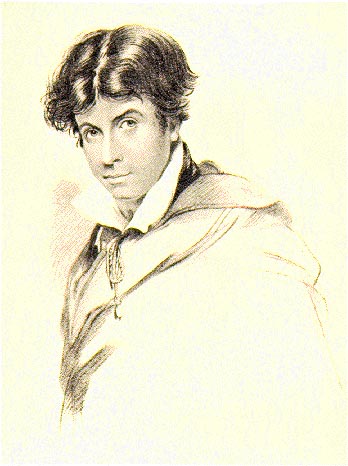
- Jenny kissed me when we met,
- Jumping from the chair she sat in.
- Time, you thief! who love to get
- Sweets into your list, put that in.
- Say I'm weary, say I'm sad;
- Say that health and wealth have missed me;
- Say I'm growing old, but add —
- Jenny kissed me!
The poem, called Rondeau, was written by Leigh Hunt (pictured above) and first published in 1838. Hunt was a minor literary figure of the Victorian era, a friend of Shelley and Keats and Dickens. His poetry has a simplicity that can make it seem trivial, but I think Rondeau is perfect. It's music allows its simplicity to breathe, and reminds us of that sincerity of unselfconscious sentiment which the Victorians at their best could summon — a sincerity which 20th century literature, charting the age of irony, completely lost touch with. Virginia Woolf, early in the century, lamented the loss, distressed that poets could no longer write lines like these, by Christina Rossetti:
My heart is like a singing bird
Whose nest is in a watered shoot;
My heart is like an apple tree
Whose boughs are bent with thickset fruit;
My heart is like a rainbow shell
That paddles in a purple sea;
My heart is gladder than all these
Because my love is come to me.
Such directness of feeling did survive in the popular arts, in pop songs and in the movies — any place where the arbiters of high culture had no influence.
Most improbably, Orson Welles recited Rondeau at the close of a pilot for a TV talk show he made towards the end of his life (which wasn't picked up.) Welles was an unregenerate Victorian, which was a source of much of his secret power, and almost all of his films deal with loss, with the memory of some sweet, unrecoverable moment in time that haunts the present . . . a characteristic Victorian theme.
Rosebud, Mr. Bernstein's girl on the ferry, the Amberson's ball, a long-past love affair with the Baroness Nagel in Warsaw, the chimes at midnight . . . all these are one with Jenny's kiss.
Leigh Hunt wrote, “Every one should plant a tree who can. It is one of the cheapest . . . as well as easiest, of all tasks.” Trees, said Hunt, “are green footsteps of our existence, which show that we have not lived in vain.”
Rondeau is such a tree.
